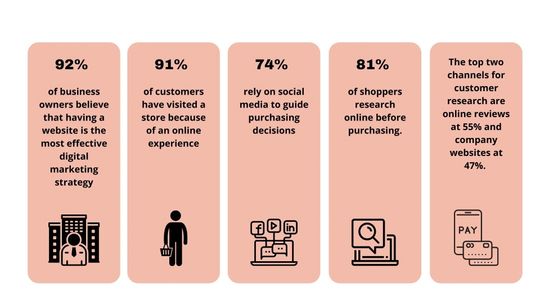
According to the statistics from last year, there are still some small businesses owners that think a marketing strategy, and especially a digital marketing strategy is a matter of business size.
1 in 5 small businesses doesn’t utilize digital marketing; and, 1 in 10 doesn’t even invest in any kind of marketing. And almost half of the small businesses that invest in it spend less than two hours per week on marketing efforts.
But are these businesses right? Is a digital marketing strategy only for large companies?

Having a digital marketing strategy nowadays is vital. It doesn’t matter the size of your business, you don’t need to spend much of your budget on digital marketing, but small changes can make a huge difference, especially when it seems like everyone is competing for attention. It’s hard to stand out from the crowd.
Here we want to share with you some small business marketing strategies that work:
1. Advertise your business online:
When it comes to advertising your business, there are several different strategies that you can use.
One of the most popular online marketing tactics is social media advertising, being Facebook Ads one of the most used. You can create ads that target specific demographics which can help you save money on advertising costs.
Another popular online marketing strategy for advertising your business when you have a limited budget is Google AdWords. That also allows you to target specific audiences with your ads, therefore you have more control of your budget.
You can also rank on Google My Business (GMB), a powerful tool if you are running a local business and is free. GMB immediately gives your business credibility and visibility by just optimizing your profile and collecting reviews and citations from your clients.
2. Content Marketing
Another popular strategy is search engine optimization (SEO). This involves optimizing your website so that it appears higher in search engine results pages but without paying for it. By investing in SEO, you can improve your website’s ranking and attract more visitors.
Unlike paid advertising, content marketing focuses more on long-term results. The initial payoff tends to be low, but the long-term, sustainable growth in visitors, leads, and customers can single-handedly carry a business.
Content is not limited to blog posts. It includes videos, podcasts, online courses, and it doesn’t only affect your website, it also includes your social media content.
If you are considering this strategy for your own business, make sure you have the time and capital. It’s a time-consuming strategy. Write quality content talking about relevant topics; optimize your website for SEO and readers, and be consistent in creating the content are tasks that you need to work on daily.
3. Connect with other local businesses
One of the best ways to market your small business is to connect with other local businesses. When you partner with other businesses you can share resources, bounce ideas off other smart people, share referrals, find talent, and identify new opportunities. You can also collaborate on marketing initiatives and events.
To connect with local businesses, start by networking with other business owners in your community. Attend business events and join online forums and groups that focus on local business collaboration. You can also reach out to local businesses directly and offer to collaborate.
They are also a major catalyst in expanding your network around the city in which you live. Connections tend to multiply.
Joining local business groups will allow you to meet up with other like-minded people who already share some common ground with you: owning a business.
4. Email marketing: build an email list
Most of the people who visit your site will not buy from you immediately. Capturing contact info for additional marketing and “lead nurturing” is a great way to sell. And it’s the first step if you want to use email marketing as part of your strategy.
Building an email list isn’t hard. It doesn’t take much time or any special skills to do, and once it’s done it saves you a lot of time in the future. Email marketing funnels begin with a “lead magnet”. This is something compelling you offer your website visitors in exchange for their email address:
- Offer something valuable (and usually free) like an eBook, free consultation, free webinar or coupon code for joining your mailing list
- Ask people who complete certain forms on your website to opt-in to receive updates from you via email
- Use social media to post about how excited you are about launching your new products/services and share where to sign up for them using links that lead directly to the sign-up form
- Include a sign-up form on all of your website pages and blog posts
There is also another option, known as “Cold marketing”, and when it comes to small business marketing, is one of the most effective strategies. It’s a great way to connect with potential customers. Here are a few tips for using cold email to market your small business:
- Start by creating a list of potential customers
- Research the companies you want to target and find out who the decision-makers are
- Draft a personalized email that introduces your business and explains why you think it would be a good fit for your products or services
- Send the email and follow up with phone calls if necessary
- Keep track of your results and adjust your strategy as needed
If you need more help with your marketing strategy, contact us, we are specialized in small businesses. We are here to help you strategize, plan and execute.




